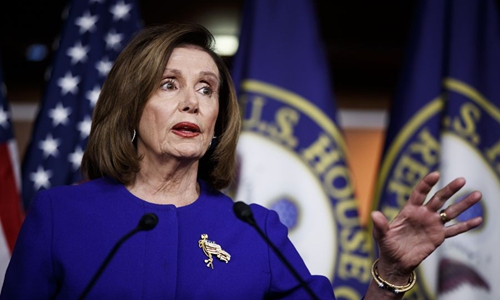HOME >> WORLD
White House's budget proposal triggers backlash from lawmakers, experts
Source:Xinhua Published: 2020/2/12 8:00:00

US House Speaker Nancy Pelosi speaks during a press conference on the Capitol Hill in Washington D.C. Jan. 9, 2020. (Photo by Ting Shen/Xinhua)
The White House on Monday unveiled a 4.8-trillion-dollar budget proposal that slashes major domestic programs and promises a balanced budget by 2035, triggering backlash from US lawmakers and experts.
The budget for the fiscal year 2021 -- running from Oct. 1, 2020 to Sept. 30 2021 -- projects the federal deficit will hit 1 trillion dollars for the current fiscal year, reducing to 966 billion dollars for the fiscal year 2021, and hover above 200 billion dollars after a decade, accounting for 4.9 percent, 4.1 percent and 0.7 percent of gross domestic product (GDP) respectively.
The budget includes 4.4 trillion dollars in "savings," bringing the deficit down each year, and putting the federal government on a path to a balanced budget in 15 years, according to the proposal issued by the Office of Management and Budget.
US House of Representatives Speaker Nancy Pelosi harshly criticized the newly released budget proposal, saying it is "a complete reversal" of the promises US President Donald Trump made in the campaign.
"Once again, the president is showing just how little he values the good health, financial security and well-being of hard-working American families," the Democratic leader said in a statement.
"The president's budget is anti-growth, does not create good-paying jobs and increases the national debt," Pelosi added.
The largest spending cut in the budget comes from 1.55 trillion dollars in cuts to non-defense discretionary programs, such as education and environmental protection, generated by reducing nominal spending 5 percent between 2020 and 2021 and an additional 2 percent each year thereafter, said the Committee for a Responsible Federal Budget (CRFB), a nonpartisan watchdog group.
"Significant further savings are generated from changes to health care, welfare programs, and reductions and reforms to other parts of the budget," the group noted.
The budget also extends individual income tax cuts beyond their 2025 expiration, which alone adds 1.5 trillion dollars to the debt, the group said.
The White House budget would increase defense spending slightly, but would also trim foreign aid by some 20 percent, which has generated doubts and provoked criticism.
"Proposing such reckless cuts to our critical foreign policy tools isn't a serious proposal. If this draconian budget were enacted, it would weaken our security and leadership around the world," Eliot Engel, chairman of the House Committee on Foreign Affairs, said in a statement.
"Congress will again reject this proposal in resounding bipartisan fashion," the senior Democratic lawmaker added.
The budget proposal relies on "optimistic" projections for economic growth and "unlikely" budget cuts to illustrate deficit reduction, said Michael A. Peterson, CEO of the Peter G. Peterson Foundation, a non-profit organization.
"The reality is that in order to manage our rapidly growing debt, we need to address the big issues -- the aging of our population, rising healthcare costs and inadequate revenues," Peterson said.
Making similar remarks, the CRFB said the budget relies on "overly optimistic" economic assumptions and "budget gimmicks that inflate its savings and distract from its actual policy reforms."
The budget assumes annual real GDP growth at 2.8 percent for 2020 and 3.1 percent for 2021, averaging 2.9 percent over the decade.
"This estimate is about 50 percent higher than those from other forecasters, who project annual growth around (and in some cases less than) 2 percent per year," it said.
Posted in: AMERICAS